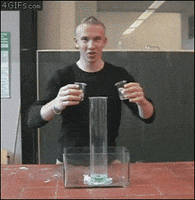Randy Holmes-Farley
Reef Chemist
View Badges
Staff member
Super Moderator
Excellence Award
Expert Contributor
Article Contributor
R2R Research
My Tank Thread
- Joined
- Sep 5, 2014
- Messages
- 67,430
- Reaction score
- 63,784
This is the proposed experiment:
- take some reef tank water, that is in the pH range that needs raising, say, pH 7.8 to 8.2, and has alkalinity in the range you suggest (7.7 to 10 dKH)
- some artificial seawater that is in the pH range that needs raising, say, 7.8 to 8.2, and has alkalinity in the range you suggest (7.7 to 10 dKH)
- Measure alkalinity of both samples
- add boost pH + until the pH rises 0.3 pH units
- Remeasure alkalinity





















